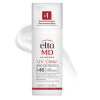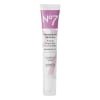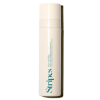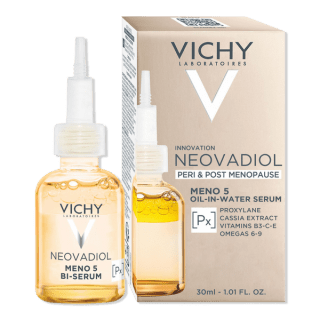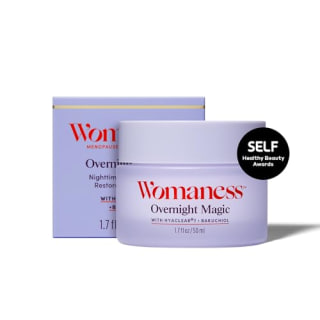Everyone knows that raging hormones during puberty can cause teenage acne. But did you know that those same hormones can also cause skin problems for women later in life? Instead of skyrocketing hormones being the culprit, it’s plummeting hormone levels.
As women approach midlife, they begin to go through something called perimenopause, followed by menopause. Major declines in certain female reproductive hormones mark these phases. This can result in several not-so-pleasant side effects— like hot flashes, joint pain, brain fog and skin changes.
To get to the bottom of what happens to your skin during menopause, we consulted board-certified dermatologists. Below, they explain how declining hormones impact your skin and what you can do about it.
What is menopause?
As a woman reaches her 40s and 50s, certain reproductive hormones start to decline — specifically estrogen and progesterone. During this time, a woman may notice specific changes within her body. For example, her menstrual cycle will become more irregular and she may start to experience hot flashes or notice that she has a harder time concentrating. This is because estrogen and progesterone are responsible for regulating periods, along with some other bodily functions. Medically, this time is known as perimenopause.
Menopause follows perimenopause. “Menopause marks when a woman’s body stops making estrogen and progesterone,” says Dr. Cristina Del Toro Badessa, a board-certified physician specializing in personalized and integrative medicine and director at Artisan Beaute, a medical spa in Atlanta. Someone is considered to officially be in menopause if they have not menstruated in 12 months.
What happens to your skin during menopause?
According to our experts, changes in your skin can be an early indicator that you’re in perimenopause. “As the largest organ in the body, the skin is often one of the first systems to show changes in hormone patterns,” says Dr. Melanie Palm, board-certified dermatologist at Art of Skin in San Diego, California.
So why does menopause impact your skin? Simply put, the hormones that decline during this period of life are responsible for several positive skin benefits. “Menopause causes a sharp decline in estrogen levels and slows down collagen production, which causes a range of changes to the skin, including dryness, skin laxity, thinning, wrinkles, photosensitivity, increased facial hair, slower wound healing, and more,” says Palm. “Progesterone plays a vital role in skin health, contributing to the vitality, structure, and inflammatory response of the skin.”
These hormone drops can also limit how much oil your body naturally produces. “A decrease in oil production can also contribute to dryness and a loss of the skin’s natural glow,” says Dr. Sonia Badreshia-Bansal, a board-certified dermatologist and co-founder, CEO, and medical director of EliteMD in Danville, California.
Beyond hormone levels directly affecting your skin, several other menopause side effects can impact your complexion. “A dip in progesterone levels during menopause can also impact quality and quantity of sleep, which can also negatively impact skin health,” says Palm. “Without good sleep, the skin isn’t able to effectively repair its cells.”
How we picked the best menopause skin care
“There are so many things that can be done to help your skin during perimenopause and menopause,” says Del Toro Badessa. “For example, you can focus on hydrating the skin with good fats in your diet— think avocados, nuts, olive oil, fatty wild-caught fish and supplements that have good fatty acids.” All of our experts also mentioned talking to your doctor about bioidentical hormone replacement therapy — a process that helps replenish some of the hormones you’re losing during menopause.
Finally, you’ll want to adjust your skin care to address the changes. With this in mind, we asked our experts what to focus on regarding product products that can help menopausal skin. Here’s what they said:
- SPF: “Women in menopause experience more sensitivity to the sun,” says Palm. “So, it is important to use a broad-spectrum sunscreen of SPF 30 or higher.”
- Hydrating ingredients: Since declining hormones cause moisture loss in your skin, you’ll want to replenish it. “Focus on hydration-boosting ingredients,” says Badreshia-Bansal. “Look for skincare products containing hyaluronic acid, ceramides, and peptides to support hydration and barrier function.”
- Texture fixers: Hormone shifts can slow down collagen production, impacting the texture of your skin — you may notice your complexion looks rough or crepe-y. “Retinoids, vitamin C, and growth factors can help stimulate collagen production and improve skin texture,” says Badreshia-Bansal.
Some menopause skin care products to shop
To round up the best skin care products for menopausal skin, we relied on the insights provided by our experts above. From there, we looked for products specifically for older or menopausal skin and prioritized options with high ratings.
Vichy Neovadiol Serum
- Goes on smooth
- Lightweight
- Shake before use
Made specifically for peri and post menopausal women, this serum has a 4.6-star average rating from 1,468 reviews on Ulta. It contains fatty acids to bring moisture back to your skin and vitamin C to brighten. This serum can be applied every morning before using your SPF and moisturizer.
Stripes Dew As I Do Moisturizer
- Good for sensitive skin
- Sustainably made
- On the pricier side
Actor Naomi Watts created this line after going through menopause herself and discovered it was difficult to find the products she needed to address the changes in her body. This moisturizer has squalane along with niacinamide to lock in hydration. The formula is also free of parabens and sulfates, making it good for sensitive skin.
No7 Menopause Skincare Firm & Bright Eye Concentrate
- For menopausal skin
- Cooling rollerball applicator
- Nothing to note
Don’t forget about the area under your eyes. The skin is naturally thinner here, which means you may notice the effects of menopause even more. This eye cream has niacinamide to moisturize and soy and red clover isoflavones to brighten, according to the brand. It also has a rollerball applicator that cools on contact in case your eyes are puffy from a sleepless night.
Womaness Overnight Magic Night Face Cream
- Rich but not greasy
- Clean ingredients
- Best for night
This night cream contains bakuchiol to address fine lines, which experts have told us is a good alternative to retinol for sensitive skin. It also contains hyaluronic acid to moisturize skin as you sleep, according to the brand. This cream is intended to be used at night after you’ve washed your face.
EltaMD UV Clear SPF 46
- No white caste
- Skin care ingredients
- On the pricier side
This sunscreen is a favorite of several NBC Select staffers, including editorial director Lauren Swanson, who says she has it on auto-ship so she never runs out. This lightweight sunscreen has an SPF 46 and offers broad-spectrum protection. It also contains niacinamide to hydrate and address discoloration and is non-comedogenic so that it won’t clog pores, according to the brand. It has a 4.6-star average rating from 44,520 reviews on Amazon.
Meet our experts
At NBC Select, we work with experts with specialized knowledge and authority based on relevant training and/or experience. We also ensure all expert advice and recommendations are made independently and without undisclosed financial conflicts of interest.
- Dr. Cristina Del Toro Badessa is a board-certified physician specializing in personalized and integrative medicine and is the director at Artisan Beaute, a medical spa in Atlanta.
- Dr. Melanie Palm is a board-certified dermatologist at Art of Skin in San Diego, California.
- Dr. Sonia Badreshia-Bansal is a board-certified dermatologist and co-founder, CEO, and medical director of EliteMD in Danville, California.
Why trust NBC Select?
Bethany Heitman is a contributor at NBC Select and a journalist who regularly covers topics like beauty, home and lifestyle. For this story, she interviewed dermatologists on menopausal skin.
Catch up on NBC Select’s in-depth coverage of tech and tools, wellness and more, and follow us on Facebook, Instagram, Twitter and TikTok to stay up to date.


